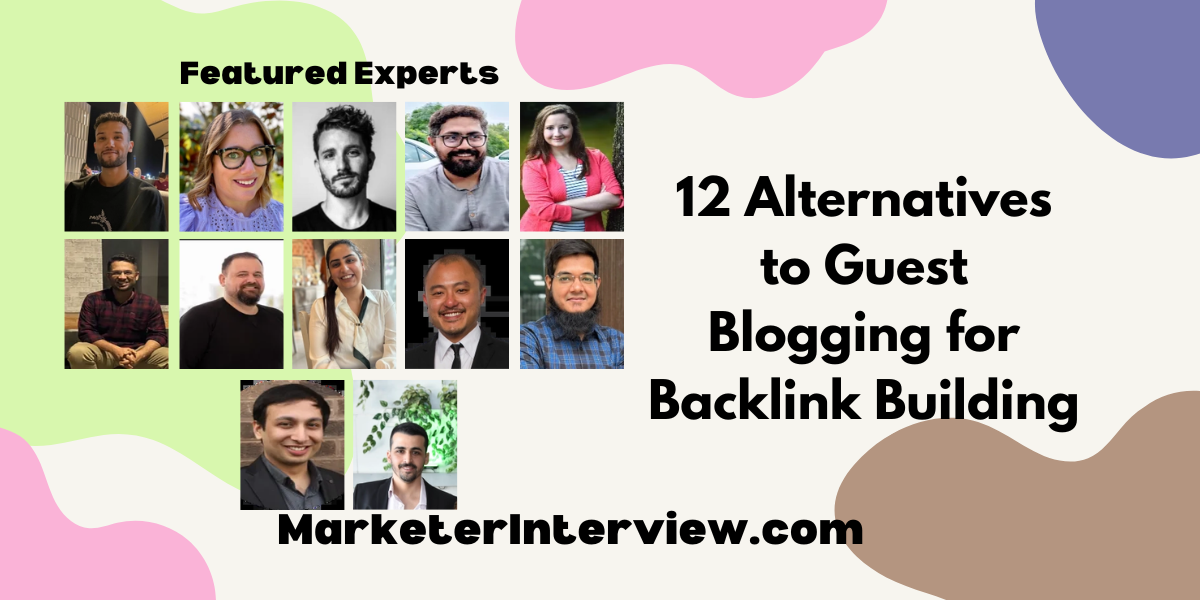12 Alternatives to Guest Blogging for Backlink Building
In the dynamic world of SEO, professionals are constantly seeking innovative methods beyond guest blogging to build backlinks. We’ve compiled insights from twelve experts, including SEO specialists and founders, detailing alternatives from leveraging content syndication platforms to utilizing niche resource pages. Discover why these strategies could be the key to enhancing your backlink profile.
Want to get quoted in MarketerInterview.com content just like this? Apply to become a contributor today!
Contents
- 1 Leverage Content Syndication Platforms
- 2 Reach Out to Journalists
- 3 Insert Links in Relevant Blog Posts
- 4 Purchase Quality Backlinks
- 5 Publish Original Research Reports
- 6 Implement Broken Link Building
- 7 Appear on Industry Podcasts
- 8 Engage in Collaborative Research
- 9 Form Content Partnerships
- 10 Utilize the Skyscraper Technique
- 11 Create and Share Data-Driven Content
- 12 Utilize Niche Resource Pages
Leverage Content Syndication Platforms
Diversifying your backlink-building strategy is key to long-term SEO success, especially as the focus shifts to AI-enabled search. With that in mind, content syndication has yielded fantastic results for Tallwave and its clients.
Content syndication expands your reach, contributes to authority through thought leadership, introduces your brand to new audiences, and helps you earn valuable backlinks. I’ve had success with syndication platforms like Medium, LinkedIn, and industry-specific directories. Incorporating content syndication into your backlink-building efforts is a win-win SEO strategy that lets you improve search engine rankings, increase brand authority, and ultimately increase conversion rates.

Laura Isaacs, SEO Content Strategist, Tallwave
Reach Out to Journalists
A less common but effective approach to building backlinks is by reaching out to journalists. Unlike guest blogging, working with reporters can land your brand in stories on high-authority sites.
The challenge here is that reporters dig deeper and have higher standards due to their editors’ scrutiny. To make this work, consider platforms like Help A Reporter Out (HARO), which connect you with journalists looking for expert insights. Building a strong, ongoing relationship with them by consistently providing valuable information can lead to more frequent mentions and backlinks.

Matias Rodsevich, Founder & CEO, PRLab
Insert Links in Relevant Blog Posts
In this link-building strategy, you simply create a list of different blog posts related to your products/services or keywords to acquire the backlink for your website. You need to reach out to the blog or website owner/marketing teams through email or their contact page and let them know that their content is amazing and informative, and you have published a blog post in detail related to their content that will help their users/visitors to gain more knowledge. Simply, you ask them to insert your link in their blog post with anchor text by providing them with two options: link exchange or payment if they don’t want to exchange the link.
Note that if your content is written and published after proper research and is helpful for the users/audience, then most bloggers will add your post link to their blog post content without any cost or any other requirements.

Tayyab Akram, Website Content Specialist, Zones, LLC
Purchase Quality Backlinks
Use a quality backlink service. The idea of buying backlinks has gotten a bad rep for many reasons, some of which are valid. You don’t want to appear spammy, and you certainly don’t want to gain links from websites that are poor quality or not relevant to your brand. Some backlink services take the path of least resistance to guarantee placement, even if those placements have nothing to do with your audience or business.
Buying backlinks is both an art and a science, and if you’re working with a quality backlink service, you’ll gain the benefits while skipping any potential risks. You can buy high-quality links from high-DA websites through dedicated services, which is the easiest (albeit somewhat expensive) way to get backlinks quickly. They do all the heavy lifting of matching you to websites in your niche, figuring out anchor text, and even writing the content on your behalf. Just be cautious of any deals or promises that seem too good to be true.

Alli Hill, Founder and Director, Fleurish Freelance
Publish Original Research Reports
One specific alternative to guest blogging for backlink building is creating comprehensive industry reports based on original research. We realized that data-driven content is incredibly valuable to other sites, especially when it’s unique and actionable. By publishing these reports, we attracted natural backlinks from authoritative sites that referenced our data in their articles.
This approach works well because it positions you as a thought leader and provides real value to the community. People are more likely to link to your content when it offers insights they can’t find elsewhere. This method builds backlinks and enhances your brand’s credibility and influence within your industry.

Christopher Pappas, Founder, eLearning Industry Inc
Implement Broken Link Building
Broken link building is a strong alternative to guest blogging for acquiring high-quality backlinks. This strategy involves finding broken links on authoritative websites within your industry and offering your own relevant content as a replacement.

Priyanka Saini, SEO Specialist, Knowledge Sourcing Intelligence
Appear on Industry Podcasts
A few years ago, we faced a challenge with a client who needed to build backlinks but had exhausted the guest-blogging route. We turned to podcast guest appearances instead. By featuring our client’s experts on relevant industry podcasts, we positioned them as thought leaders and secured high-quality backlinks from podcast show notes and related articles.
This approach worked wonders because podcast hosts often have loyal audiences and well-established domain authority. The content felt more authentic and engaging, which resonated with listeners and led to natural backlink growth without the fatigue of traditional guest blogging.

Sahil Kakkar, CEO & Founder, RankWatch
Engage in Collaborative Research
Collaborative research projects offer a powerful alternative to guest blogging for backlink building. This approach involves partnering with complementary businesses or thought leaders to produce in-depth, data-driven content.
By combining resources and expertise, you create high-value assets that naturally attract backlinks from authoritative sources. These projects often result in comprehensive reports, infographics, or interactive tools that other industry players want to reference.
This method is particularly effective because it provides unique, citable data that’s inherently more linkable than opinion-based guest posts. It also fosters relationships within your industry, opening doors for future collaborations and exposure. Additionally, it helps to position your brand as an authority, improving credibility beyond mere backlink acquisition.

Yoyao Hsueh, Founder, Blustrat Digital Agency
Form Content Partnerships
One effective alternative to guest blogging for backlink building is collaborative content partnerships. In my 10+ years of SEO experience working with international and local brands, I’ve found these partnerships highly valuable for backlink building and overall SEO.
Collaborative content partnerships diversify your backlink sources and support broader marketing goals like brand awareness and thought leadership. They foster genuine connections and drive sustainable SEO results, positioning your brand for long-term success.

Abdul Samad, SEO Specialist, Enterprise64
Utilize the Skyscraper Technique
I tend to use a variety of methods for backlink building, as no one method can produce enough results. However, one of my favorite tricks of the trade is the skyscraper technique. This method involves finding the highest-ranking and most-linked content in a specific niche. I look for the most popular content out there and then create something better.
The goal is to produce content that offers more value compared to the currently best-performing content. I then promote the content to industry experts. This often leads to a snowball effect of accumulating more inbound links and higher search rankings.

Dan Brown, Founder and CEO, Textun
One alternative we’ve successfully used for backlink building is creating data-driven content. For instance, we conducted a unique industry survey for one of our clients, compiling the findings into a comprehensive report. We then contacted industry influencers and media outlets, offering exclusive insights from the report.
This strategy earned our clients authoritative backlinks and boosted their credibility as an industry leader. Data-driven content is powerful because it provides value, making it more likely that others will reference and link back to it. It also avoids the oversaturation of guest blogging.

Vaibhav Kakkar, CEO, Digital Web Solutions
Utilize Niche Resource Pages
One specific alternative to guest blogging for backlink building is using resource pages. Resource pages are sections on websites dedicated to listing valuable tools, guides, articles, or other resources related to a particular topic. I’ve found this method incredibly effective.:
Start by searching for resource pages in your niche. Use Google search queries like “your topic + resources,” “your topic + links,” or “best resources for your topic.” For example, if you’re in the fitness industry, search for “fitness resources” or “best fitness guides.” You can also look for link round-ups or “curated lists” related to your field. Tools like Ahrefs or Moz can help identify pages that link out to similar content.
Next, ensure you have high-quality content that fits the resource page’s theme. This could be a comprehensive guide, an in-depth article, a useful tool, or a research report. For instance, if you’re targeting a resource page on volleyball training, your content might be an ultimate guide on effective drills or a detailed article on improving player performance.
Once you’ve identified the right resource pages, contact the site owners or content managers. Send a polite and personalized email introducing yourself, explaining why your content would be a valuable addition to their resource page, and how it aligns with their existing links. Be sure to highlight what makes your content unique. For example, you could say, “I noticed your page lists several useful resources for volleyball training. I recently published a comprehensive guide on advanced drills that could be a great addition to your list.”
Finally, if you don’t hear back immediately, a friendly follow-up email can help. Reiterate your value proposition and check if they need any additional information.

Hicham Badri, Athlete, Blogger, ServeAndSave
Want to get quoted in MarketerInterview.com content just like this? Apply to become a contributor today!






